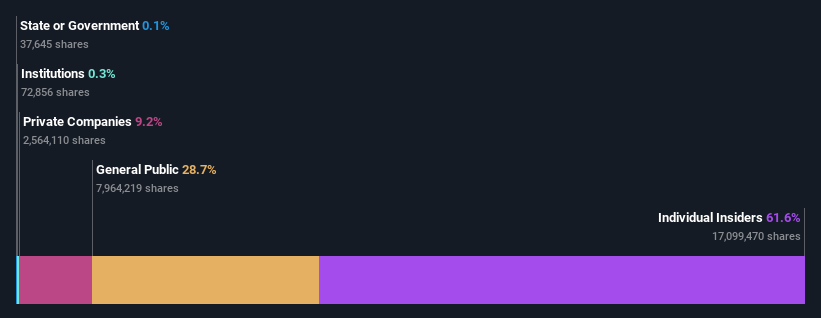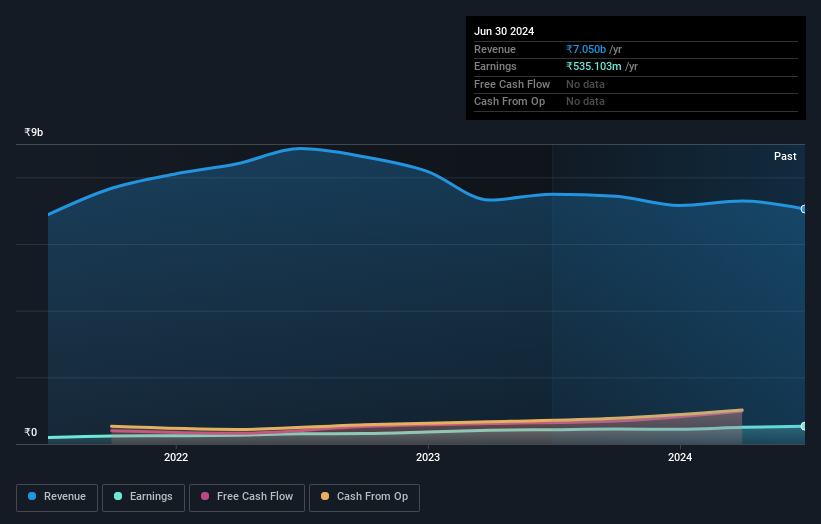- India
- /
- Metals and Mining
- /
- NSEI:KAMDHENU
Kamdhenu Limited's (NSE:KAMDHENU): Senior Key Executive Sunil Agarwal is the most bullish insider, and their stock value gained 16% last week

Key Insights
- Significant insider control over Kamdhenu implies vested interests in company growth
- A total of 5 investors have a majority stake in the company with 54% ownership
- Using data from company's past performance alongside ownership research, one can better assess the future performance of a company
A look at the shareholders of Kamdhenu Limited (NSE:KAMDHENU) can tell us which group is most powerful. With 62% stake, individual insiders possess the maximum shares in the company. That is, the group stands to benefit the most if the stock rises (or lose the most if there is a downturn).
Clearly, insiders benefitted the most after the company's market cap rose by ₹2.2b last week.
Let's delve deeper into each type of owner of Kamdhenu, beginning with the chart below.
See our latest analysis for Kamdhenu

What Does The Lack Of Institutional Ownership Tell Us About Kamdhenu?
Institutional investors often avoid companies that are too small, too illiquid or too risky for their tastes. But it's unusual to see larger companies without any institutional investors.
There are many reasons why a company might not have any institutions on the share registry. It may be hard for institutions to buy large amounts of shares, if liquidity (the amount of shares traded each day) is low. If the company has not needed to raise capital, institutions might lack the opportunity to build a position. On the other hand, it's always possible that professional investors are avoiding a company because they don't think it's the best place for their money. Kamdhenu's earnings and revenue track record (below) may not be compelling to institutional investors -- or they simply might not have looked at the business closely.

We note that hedge funds don't have a meaningful investment in Kamdhenu. Our data suggests that Sunil Agarwal, who is also the company's Senior Key Executive, holds the most number of shares at 23%. When an insider holds a sizeable amount of a company's stock, investors consider it as a positive sign because it suggests that insiders are willing to have their wealth tied up in the future of the company. Satish Agarwal is the second largest shareholder owning 11% of common stock, and Saurabh Agarwal holds about 7.9% of the company stock. Note that two of the top three shareholders are also Chief Executive Officer and Member of the Board of Directors, respectively, once again pointing to significant ownership by company insiders.
After doing some more digging, we found that the top 5 shareholders control more than half of the company's shares which essentially means that there is concentrated ownership amongst the top shareholders, most of whom happen to be insiders!
Researching institutional ownership is a good way to gauge and filter a stock's expected performance. The same can be achieved by studying analyst sentiments. Our information suggests that there isn't any analyst coverage of the stock, so it is probably little known.
Insider Ownership Of Kamdhenu
While the precise definition of an insider can be subjective, almost everyone considers board members to be insiders. Management ultimately answers to the board. However, it is not uncommon for managers to be executive board members, especially if they are a founder or the CEO.
Most consider insider ownership a positive because it can indicate the board is well aligned with other shareholders. However, on some occasions too much power is concentrated within this group.
It seems that insiders own more than half the Kamdhenu Limited stock. This gives them a lot of power. Given it has a market cap of ₹16b, that means they have ₹9.6b worth of shares. Most would be pleased to see the board is investing alongside them. You may wish todiscover (for free) if they have been buying or selling.
General Public Ownership
With a 29% ownership, the general public, mostly comprising of individual investors, have some degree of sway over Kamdhenu. This size of ownership, while considerable, may not be enough to change company policy if the decision is not in sync with other large shareholders.
Private Company Ownership
We can see that Private Companies own 9.2%, of the shares on issue. It might be worth looking deeper into this. If related parties, such as insiders, have an interest in one of these private companies, that should be disclosed in the annual report. Private companies may also have a strategic interest in the company.
Next Steps:
I find it very interesting to look at who exactly owns a company. But to truly gain insight, we need to consider other information, too. Consider for instance, the ever-present spectre of investment risk. We've identified 2 warning signs with Kamdhenu , and understanding them should be part of your investment process.
If you would prefer check out another company -- one with potentially superior financials -- then do not miss this free list of interesting companies, backed by strong financial data.
NB: Figures in this article are calculated using data from the last twelve months, which refer to the 12-month period ending on the last date of the month the financial statement is dated. This may not be consistent with full year annual report figures.
Valuation is complex, but we're here to simplify it.
Discover if Kamdhenu might be undervalued or overvalued with our detailed analysis, featuring fair value estimates, potential risks, dividends, insider trades, and its financial condition.
Access Free AnalysisHave feedback on this article? Concerned about the content? Get in touch with us directly. Alternatively, email editorial-team (at) simplywallst.com.
This article by Simply Wall St is general in nature. We provide commentary based on historical data and analyst forecasts only using an unbiased methodology and our articles are not intended to be financial advice. It does not constitute a recommendation to buy or sell any stock, and does not take account of your objectives, or your financial situation. We aim to bring you long-term focused analysis driven by fundamental data. Note that our analysis may not factor in the latest price-sensitive company announcements or qualitative material. Simply Wall St has no position in any stocks mentioned.
About NSEI:KAMDHENU
Kamdhenu
Engages in the manufacture, marketing, and distribution of thermo mechanical treatment (TMT) bars, structural steel, and allied products under the Kamdhenu brand name in India.
Flawless balance sheet with proven track record and pays a dividend.
Similar Companies
Market Insights
Community Narratives



